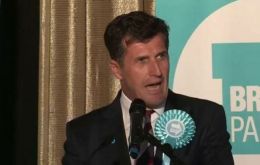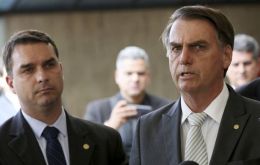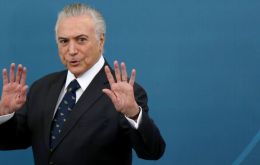MercoPress. South Atlantic News Agency
Tag: politics
-
Thursday, November 14th 2019 - 18:30 UTC
As populism advances, beware of the Polish secret

By Gwynne Dyer – There is a tension at the heart of populist political parties that may ultimately lead most of them to electoral defeat. They depend heavily on the votes of the old, the poor and the poorly educated — “I love the poorly educated,” as Donald Trump once put it — but they are also right-wing parties that do not like what they call “socialism.” (Other people call it the welfare state.)
-
Thursday, July 18th 2019 - 09:40 UTC
What did the Mercosur’s leaders say about Venezuela in Santa Fe?

The political and economic crisis in Venezuela was the center of the political debate among the heads of state that, this Wednesday, met in Santa Fe, Argentina in the Mercosur semi-annual summit, a block from which the Caribbean country is currently suspended. Neither Uruguay, Bolivia nor Chile addressed a word regarding the Venezuelan situation.
-
Sunday, July 14th 2019 - 15:04 UTC
Argentina condemns British MEP's likening foreign fishing to Belgrano sinking

Argentina harshly condemned the “lamentable declarations of British MEP Robert Rowland” in which he threatened foreign fishing in the Falklands area with “the same treatment as the Belgrano,” in reference to the Argentine cruise sunk by the United Kingdom during the 1982 war.
-
Monday, July 1st 2019 - 09:59 UTC
Uruguay: No surprises in a primary with a record of candidates

In a primary election full of new faces and overshadowed by accusations of “dirty” campaigns, there were no surprises in the results of the internal elections of Uruguay's main political parties, according to the data of the pollsters. Daniel Martínez (Frente Amplio), Luis Lacalle Pou (National Party) and Ernesto Talvi (Colorado Party) will represent the three parties with the greatest adhesion in the country, starting a new stage in the national elections in October.
-
Wednesday, February 6th 2019 - 09:22 UTC
“Neutral” Uruguay's name mentioned in attempts to drain Venezuelan coffers

A bank in Portugal has blocked Venezuela’s attempt to transfer US$ 1.2 billion to Uruguay, a lawmaker said on Tuesday as the opposition to President Nicolas Maduro warned of the theft of public funds, while the United States sent food and medical aid to the Venezuelan-Colombian border.
-
Friday, February 1st 2019 - 10:43 UTC
New Brazilian Congress opens with great challenges, but Bolsonaro has been made vulnerable by Flavio's finances

The real business of governing Brazil starts this Friday for president Jair Messias Bolsonaro with the opening of the new congress through which his ambitious reform program must pass. The former army captain is currently absent from Brasilia will have to follow events from his hospital bed in São Paulo, where he is recovering from a third major operation following his stabbing at a campaign rally last year that almost cost him his life.
-
Monday, January 28th 2019 - 09:21 UTC
Maduro rejects elections but gives US diplomats 30 days to leave; Guaidó calls for protests on Wednesday and Saturday

The US has warned Venezuela that any threats against American diplomats or opposition leader Juan Guaidó will be met with “a significant response”. National Security Adviser John Bolton said any such “intimidation” would be “a grave assault on the rule of law”.
-
Thursday, December 13th 2018 - 21:19 UTC
Socialist Pablo Iglesias regrets about Venezuela: “The political and economic situation is disastrous”

The Spanish Socialist leader, Pablo Iglesias, appeared before the Spanish Senate on Thursday over the alleged illegal financing that his political coalition, Podemos, could have received from Venezuela and Iran. In a tense debate with a senator from the Popular Party (PP), Iglesias said that the situation in the South American country “is disastrous” and that he regrets things he has said in the past.
-
Monday, June 18th 2018 - 07:21 UTC
Temer's record unpopularity linked directly to the performance of the economy

A Datafolha survey shows that the all-time high unpopularity of Brazilian President Michel Temer (MDB) is due essentially to dissatisfaction with the overall performance of his administration, particularly regarding the economy. It also shows that the president's personal image and the loss of status caused by corruption scandals that involve him are secondary issues.
-
Tuesday, May 8th 2018 - 08:25 UTC
Should we celebrate Karl Marx on his 200th birthday?

By Barbara Foley (*)
Some would argue that Karl Marx, author of “Capital,” has been proven wrong on just about everything he wrote. The founder of scientific socialism was born 200 years ago on May 5.
